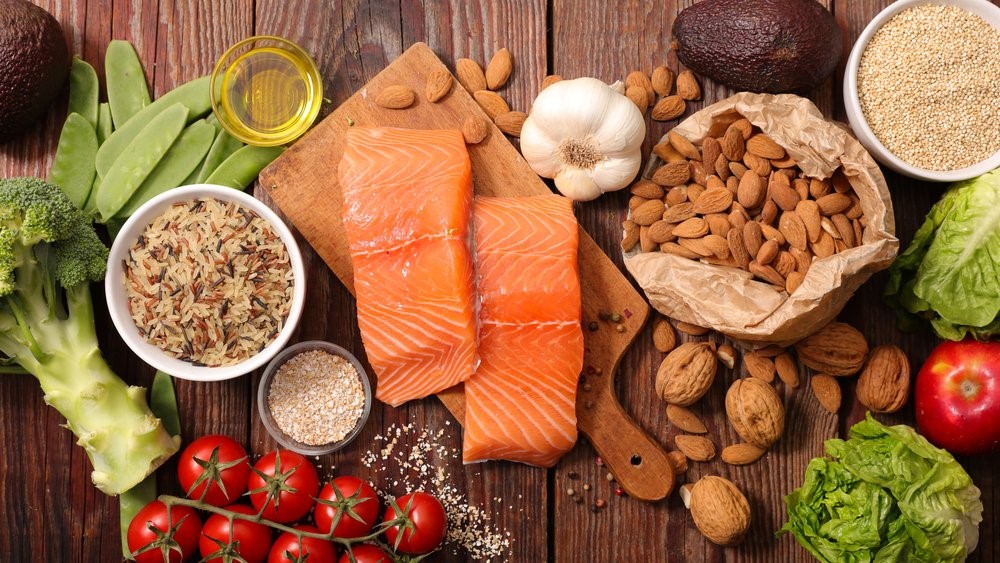Your thyroid gland needs specific nutrients to maintain its proper functioning. Your current intake of foods and beverages may not be adequate to maintain good thyroid health. There are nutritional steps you can take to help your gland do its work. Start with iodine because it is the first and foremost need your body has to maintain consistent hormone production and circulation.
Your weekly diet should contain quality sources of foods such as protein, vitamins, minerals, and antioxidants to assist the thyroid gland. Consider these foods to maintain your health:
- Almonds
- Beans
- Coconut Oil
- Dairy
- Dark Green Leafy Vegetables
- Dulse Seaweed
- Eggs
- Fish
- Liver and Kidney Meat
- Turkey
Nuts: Almonds and Brazil Nuts – These two nuts provide excellent nutrients such as proteins, minerals, fiber, and vitamins. The B vitamins, selenium, iron, and zinc offer great support for your thyroid gland.
Beans – The ordinary pinto and lima beans are fabulous sources of quality proteins and vitamins B and C. Large amounts of selenium are found in them and many other varieties.
Coconut Oil – The oil from a coconut contains fatty acids required for vital metabolic functioning. It is a healer because it is easily assimilated and contributes to thyroid hormone production and regulation of our body’s metabolism.
Dairy – Dairy items such as milk, yogurt, cheese, and cottage cheese contribute to healthy iodine levels in our bodies.
Dark Green Leafy Vegetables – Although these vegetables are avoided by many people, they work extremely well with our thyroid gland to keep it healthy. Eat one or more of them:
- Collard Greens
- Kale
- Mustard Greens
- Swiss Chard
- Spinach
- Turnip Greens
Dark green leafy vegetables are superfoods that give us vitamins A, B, C, and D, iron, and magnesium.

Dulse Seaweed – Dulse and other seaweeds offer high concentrations of iodine, potassium, and protein. Although seaweed may not be readily available to you, try it occasionally to vary your diet and improve your health. Find out more about seven benefits of eating seaweed.
Eggs – Fresh Eggs are one of the healthiest foods on that planet and contain a strong variety of supporting nutrients, including iodine, iron, selenium, vitamin D, and zinc. As a bonus, eggs can raise your “good” HDL cholesterol and change your “bad” LDL cholesterol.
Fish – Fish such as cod, haddock, and salmon provide iodine and omega-3 fatty acids that contribute to a healthy thyroid and heart. Consume them regularly for improved health and vitality.
Liver and Kidney Meat – These meats supply high-quality proteins, iron, zinc, and selenium. They are a nutrient-dense source of vitamins A, B, C, and D, calcium, and potassium. They rival fruits and vegetables in supplying these four vitamins.
Turkey – Turkey is an excellent source of lean protein, iron, selenium, and amino acids. As you know, turkey is not just for Thanksgiving anymore and should be enjoyed year-round.
Foods to Avoid or Reduce If You Have Thyroid Problems
Now that you are aware of some great foods that support thyroid health, you should know there are also some to avoid. One of them is soy products that contain edamame that can block your gland’s ability to produce key hormones. Eat a limited about of this food to be on the safe side of your diet.
Some thyroid sufferers should limit their intake of kale, cabbage, broccoli, cauliflower, and Brussels sprouts because they can prevent the thyroid from getting enough iodine. Although they are commonly called ‘superfoods’, check with your doctor for any possible side effects.
If you have Celiac Disease, avoid gluten found in wheat and other products. Eating a lot of “fast foods” is bad for you because of their high amounts of sodium, saturated fat, and cholesterol. It’s interesting to know that fast food restaurants are not required to add iodized salt to their food items.

Avoid coffee and caffeine if you have hypothyroidism and taking thyroid medications because coffee blocks absorptions of hormone replacement. Drinking coffee when taking your daily meds can defeat their purpose. Take your medications only with water to get the most benefit from them. If you do drink coffee, wait at least 30 minutes or more after taking your meds.
The more you know about your thyroid condition and the types of foods that affect it, the healthier you will be!


Hey this is awesome info. Dr. Sears is the best in the field.